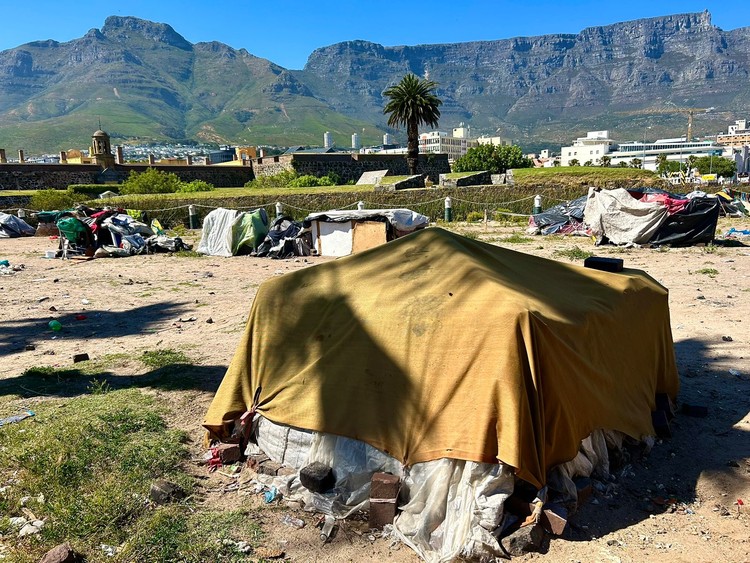Public works “working” on evicting people occupying land at the Castle
Cape Town mayor concerned about the lack of a clear timeline
The Department of Public Works and Infrastructure is in the process of seeking an eviction order against dozens of people occupying land around the Castle of Good Hope in Cape Town’s city centre. Photo: Matthew Hirsch
- Minister of Public Works and Infrastructure Sihle Zikalala has announced the department’s intention to evict dozens of people occupying land surrounding the Castle of Good Hope in the Cape Town city centre.
- But Cape Town’s mayor Geordin Hill-Lewis is concerned about the department’s lack of clear timelines.
- The department has been strongly criticised by Members of Parliament for failing to maintain its properties.
An eviction order against dozens of people occupying land at the Castle of Good Hope in Cape Town is being sought by the Department of Public Works and Infrastructure (DPWI), which owns the land.
During a site visit on Thursday, DPWI minister Sihle Zikalala said his department was in the process of obtaining an eviction order.
“I’ve instructed our legal team to work with speed to ensure that the matter is addressed,” said Zikalala.
The DPWI was earlier this month strongly criticised by Members of Parliament for allowing a more than two-hectare prime property in Wynberg to become derelict and Illegally occupied.
The mismanagement of DPWI property “is a country-wide issue”, said Zikalala on Thursday. “A number of buildings have been illegally occupied. We will want to ensure that we bring back all state assets,” he said, adding that some properties would have to “be released” and the department would have to “work with NGOs and other partners”.
During his visit on Thursday, Zikalala spoke to Castle of Good Hope CEO Calvyn Gilfellan who said the number of homeless people who were living on land just outside the castle walls had grown significantly during the Covid lockdown.
Gilfellan said the castle land was attractive because of access to water (the Castle is surrounded by a moat), and the economic opportunities the city centre offered. But he said they were living in “sub-human” conditions. “We need a human-centred solution to this. People can’t live like that,” he told the minister.
Cape Town Mayor Geordin Hill-Lewis said they had been informed of the DPWI’s intention to seek an eviction order but noted there were no clear timelines.
Asked whether he still planned to seek an eviction order against the occupiers of land at the Castle on behalf of the DPWI, effectively forcing their hand, as he threatened to do earlier this year, Hill-Lewis said the City would prefer DPWI take action themselves. However, he said the City would act if there was further delay.
“We can’t allow the Castle to continue to be a site of urban decay. The City’s concern remains the lack of clear timeframes from Public Works, as the matter is urgent given the ongoing impact on businesses, tourism, and the general public in the vicinity of the Castle.”
“Where must we go?”
Living on the land surrounding the castle, a man who only gave his name as Tendai, said he’d be willing to move into a shelter if he had the option.
Tendai said he became homeless after he was hit by a car and was no longer able to work. “I was staying in Gugulethu and I was hit by a car and had to go to hospital. Until now I can’t work,” he said.
Another man, who introduced himself only as Thobile, said he was originally from Philippi but had been living on the street for almost 20 years.
He said the problem with the shelters offered by the City of Cape Town was that there were rules such as having to leave during the day.
Asked about government wanting to evict them from the land at the castle, he said it made him want to “puke”. “They want to chase us from here. Where must we go? We are human beings.”
© 2023 GroundUp. This article is licensed under a Creative Commons Attribution-NoDerivatives 4.0 International License.
You may republish this article, so long as you credit the authors and GroundUp, and do not change the text. Please include a link back to the original article.
We put an invisible pixel in the article so that we can count traffic to republishers. All analytics tools are solely on our servers. We do not give our logs to any third party. Logs are deleted after two weeks. We do not use any IP address identifying information except to count regional traffic. We are solely interested in counting hits, not tracking users. If you republish, please do not delete the invisible pixel.



